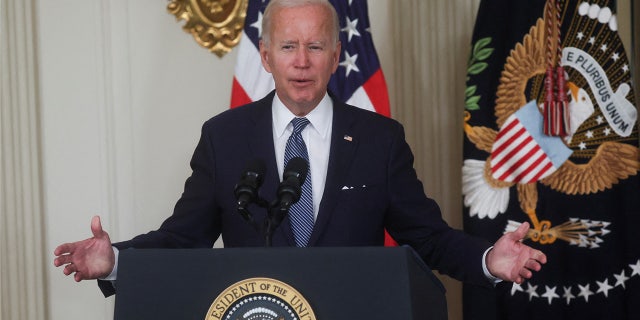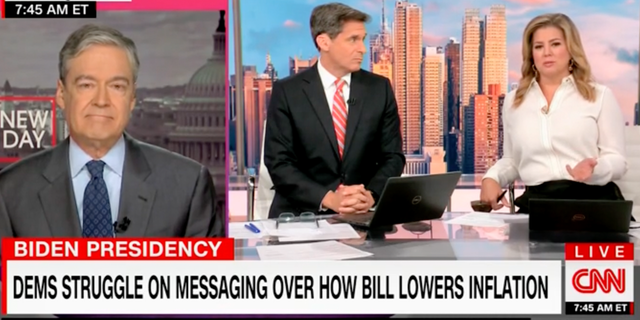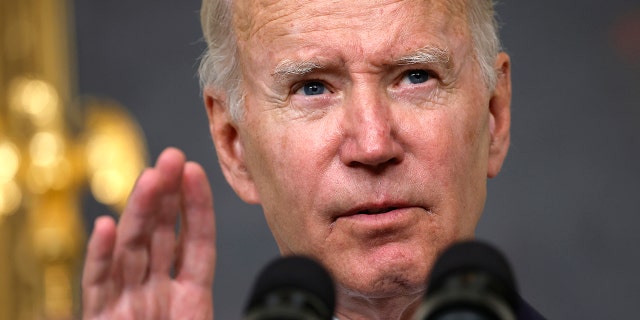(Fox News) Left-leaning media networks, including MSNBC, ABC, and CNN, finally realized that the Inflation Reduction Act doesn’t actually reduce inflation, but not until the massive spending package had already been signed into law.
The bill, which was passed by the Senate earlier this month and the House of Representatives last week, costs an estimated $437 billion, with $369 billion going toward investments in “Energy Security and Climate Change,” according to a summary by Senate Democrats.
Democrats claim the legislation will soften the deficit by raising $737 billion, imposing a 15% corporate minimum tax which is predicted to raise $222 billion, and prescription drug pricing which the Senate estimates will raise $265 billion.
One thing the Inflation Reduction Act is not expected to do, according to multiple analyses, is reduced inflation. The Congressional Budget Office said the bill will have “a negligible effect” on inflation in 2022, and in 2023 its impact would range between reducing inflation by 0.1% and increasing it by 0.1%.

U.S. President Joe Biden (R) moves to give Sen. Joe Manchin (D-WV) (L) the pen he used to sign The Inflation Reduction Act with Senate Majority Leader Charles Schumer (D-NY) in the State Dining Room of the White House August 16, 2022 in Washington, DC. (Drew Angerer/Getty Images)
These facts were hard to come by on a number of liberal media networks, with reporters and hosts parroting the talking points of congressional Democrats, or at the very least failing to press them on the bill’s perplexing name.
Four days before the Inflation Reduction Act was passed, CNN analyst Ryan Lizza called the legislation a “big deal,” and said that its passage would make Joe Biden an “enormously consequential president” whose legislative win would put him in the “modern pantheon” of great leaders.
Less than a week before the bill was signed, NBC Nightly News hyped the Inflation Reduction Act as a “blockbuster billion-dollar deal” with “unprecedented” investments in energy that will put “downward pressure” on inflation.
A day earlier, CNN Newsroom host Pamela Brown claimed Biden was “one of the legislatively successful presidents in modern history,” and became confrontational with former Trump campaign advisor David Urban over the Inflation Reduction Act.
According to an analysis of Grabien transcripts, only ABC’s George Stephanopoulos, CNBC’s Joe Kernen and CNN’s Poppy Harlow pressed their guests on the bills meager impact on inflation prior to it passing the Senate.

U.S. President Joe Biden speaks during a bill signing ceremony where the president is signing “The Inflation Reduction Act of 2022” into law in the State Dining Room of the White House in Washington, U.S. August 16, 2022. (REUTERS/Leah Millis)
But, once the bill came into law, the liberal media suddenly began asking tough questions, asking guests why the legislation was named the Inflation Reduction Act if it did not in fact reduce inflation.
On Tuesday’s installment of CNN’s “New Day,” CNN’s Brianna Keilar claimed that passage of the bill was a “significant victory for Biden’s agenda and for his party, even if questions remain about whether it will live up to its name.
John Harwood told John Berman and Keilar that the spending bill signed by President Joe Biden was titled the Inflation Reduction Act as a “marketing device” to get moderate Democrats, such as Senator Joe Manchin, D-W.Va., to support it.
Harwood echoed the words of the Congressional Budget Office when he said the legislation would have a “negligible” effect on lowering inflation and asserted that the legislation did not live up to its name, and concluded that the bill did not live up to its name.
But six days before the bill was signed Harwood made no mention of this “negligible effect” or “marketing device” name, instead calling the Inflation Reduction Act a “sudden reversal of fortune” for the president.
“First of all, it’s important to stop and recognize the breadth of accomplishments that Democrats and President Biden have achieved, he said at one point.

CNN reporter John Harwood tells CNN New Day that the Inflation Reduction Act will have a ‘negligible’ impact on inflation.(CNN)
MSNBC contributor and Vote Latino’s founding president Maria Teresa Kumar similarly praised President Biden and the Democrats for the “marketing branding genius behind their latest spending bill.
On Wednesday, economist Jeffrey Sachs also claimed the legislation was a “marketing tool” that “doesn’t address inflation at all” during a conversation with CNN’s Randi Kaye.
Just hours after the passage of the bill, ABC’s Jonathan Karl presented the findings of the CBO report to White House press secretary Karine Jean-Pierre.
“But let me ask you, it’s called the Inflation Reduction Act, but the Congressional Budget Office which is nonpartisan said that there would be a negligible impact on inflation this year and barely impact inflation at all next year, isn’t it almost Orwellian?” Karl asked Jean-Pierre.







